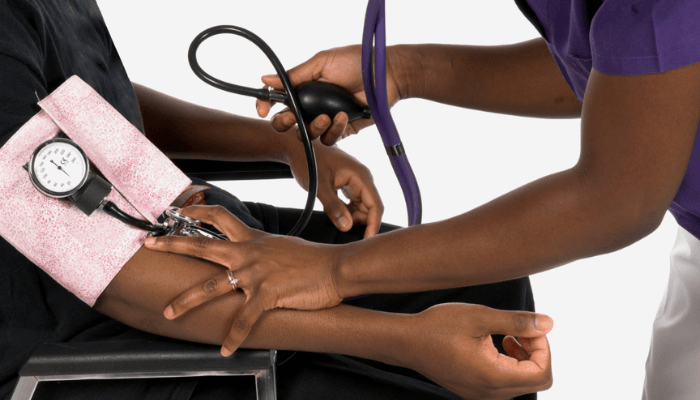By Isaac Atunlute
Globally, hypertension is a leading risk factor for cardiovascular and kidney disease, responsible for 10 million fatalities annually.
In Nigeria, the prevalence of hypertension has surged in recent decades, with regional estimates ranging from 22% to 44%.
Despite this widespread impact, awareness, treatment, and control rates remain alarmingly low. A 2021 meta-analysis revealed that only 29% of Nigerians with hypertension were diagnosed, only 12% were on treatment, and a mere 3% had their condition under control.
These statistics highlight the immense challenges that Nigeria faces in managing this silent epidemic.
“I felt fine—until I wasn’t,” remarks 52-year-old Grace Abiodun, a trader in Abuja, who collapsed at her stall and was then diagnosed with dangerously high blood pressure. Like so many Nigerians, she didn’t realise she was hypertensive.
Abiodun’s is not an isolated case. Many Nigerians unknowingly live with hypertension, often dismissing symptoms such as headaches, dizziness or fatigue as mere stress or signs of aging.
This prevalent unawareness allows the condition to silently wreak havoc until severe complications like heart attacks, stroke or kidney failure strike.
With only fractions of those affected receiving proper treatment and even fewer achieving effective blood pressure control, Nigeria faces a looming public health disaster.
Mayowa Ayorinde, a health expert, stresses the critical need for awareness. “Hypertension is rising in Nigeria, and the patients are sometimes not even aware.”
He recommends regular blood pressure checks and awareness campaigns to prevent a wave of complications.
Challenges in Management
In Nigeria, managing hypertension is fraught with challenges. Limited access to healthcare facilities, the high cost of medication and cultural misconceptions often hamper effective control. Additionally, the asymptomatic nature of the disease means many individuals underplay its severity until it’s too late.
What to Do If You Discover You Have High Blood Pressure:
- Take medication as prescribed.
- Reduce salt intake.
- Eat healthy foods.
- Exercise regularly.
- Avoid smoking and alcohol.
- Monitor your blood pressure at home.
- Visit your doctor frequently.
Strategic Interventions for Tackling Hypertension in Nigeria.
Community Mobilisation: Creating awareness programmes for the purpose of sensitising the general population about the risk and management of hypertension.
Healthcare Access: Enhancing access to primary health care so that blood pressure monitoring and the treatment itself are within reach.
Lifestyle Modification: Offering diet modification, exercise, and stress reduction.
Targeted Programmes: Initiatives like the Hypertension Treatment in Nigeria (HTN) Programme are vital steps in improving disease control through standard treatment regimens and community intervention.
Conclusion
Hypertension remains a significant but often overlooked threat to public health in Nigeria. With improved awareness, accessible healthcare, and a concerted push for long-term management, the silent killer can be brought under control and a healthier future secured.
Hypertension is a global health concern, causing 10 million deaths annually, and is particularly pressing in Nigeria, where rates have skyrocketed with regional estimates between 22% and 44%. Despite its prevalence, awareness, treatment, and control in Nigeria are critically low, with only 29% diagnosed, 12% treated, and 3% controlled, underscoring the need for intervention. Many Nigerians, like Grace Abiodun, live with undiagnosed hypertension, mistaking symptoms for stress or aging, risking severe complications such as heart attacks and strokes. Challenges in managing hypertension include limited healthcare access, high medication costs, and cultural misconceptions, which are exacerbated by the disease's asymptomatic nature.
To tackle this public health issue, increased emphasis on regular blood pressure checks and public awareness campaigns is crucial. Managing hypertension effectively involves medication adherence, reduced salt intake, a healthy diet, regular exercise, avoiding smoking and alcohol, home monitoring, and frequent doctor visits. Strategic interventions include community mobilization, enhanced healthcare access, lifestyle modification programs, and initiatives like the Hypertension Treatment in Nigeria (HTN) Programme to standardize treatment and control the disease effectively. Improved awareness and a strategic, health-focused approach are essential to combating hypertension in Nigeria, ensuring long-term health benefits.






